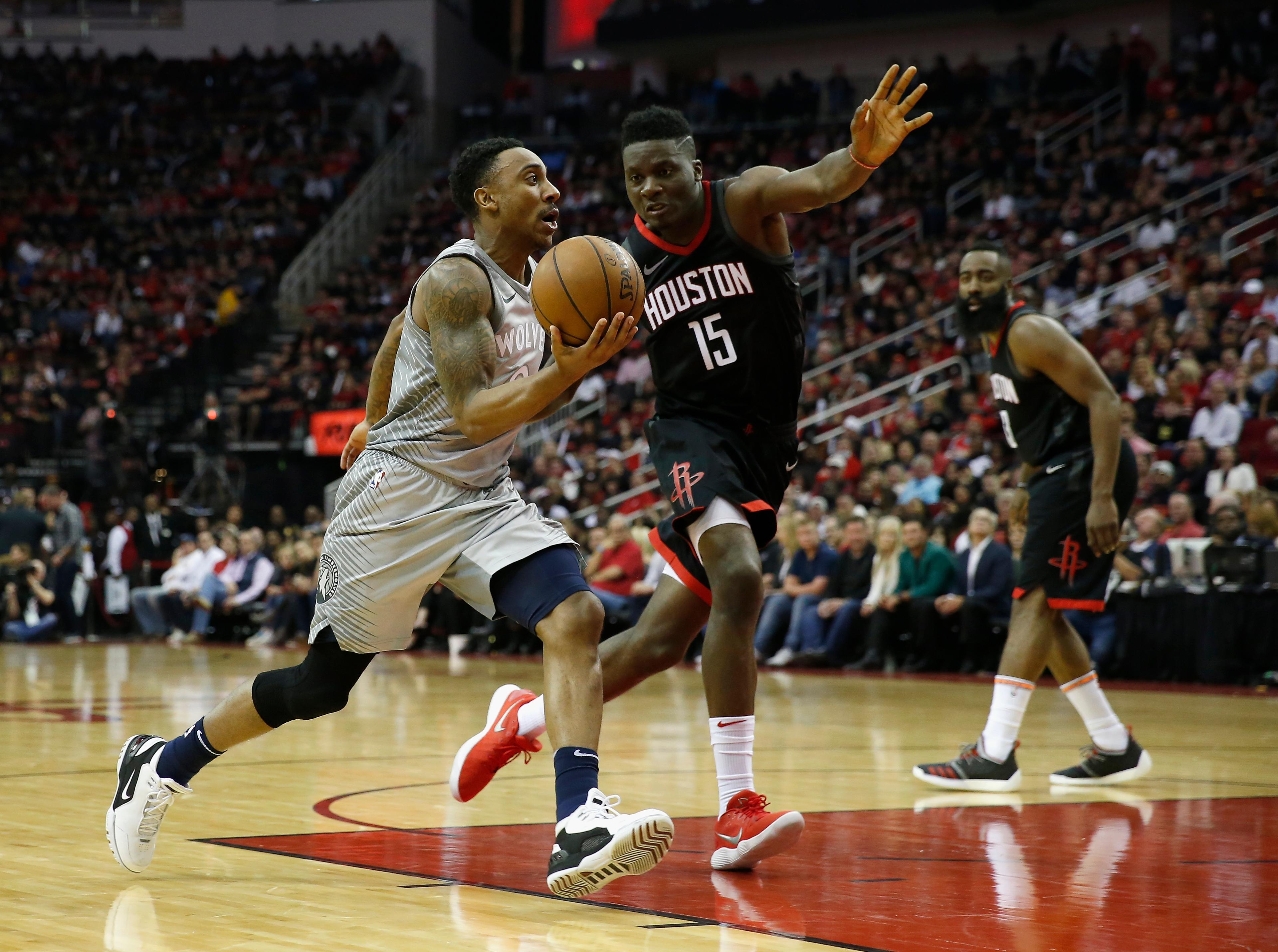
We have a series in Minneapolis! The Wolves cobbled together a good #teamwin in Game 3 with a convincing 121-105 victory against the Rockets at home. Here are three takeaways from their performance:
A Towns of Two Halves
Karl-Anthony Towns has presented himself as a conundrum in this series. Why is he going entire quarters without getting a single shot off? Is it the system? Is it the lack of aggressiveness?
Towns’s first half Saturday looked like a distasteful rerun of what happened in the first two games of this series, in which he scored a combined 13 points in nearly 64 minutes. Lackadaisical and out of rhythm out of the gate on Saturday, he failed to gain position and was flummoxed by double-teams, got lost on defense and spent more time stretching his arms in complaint to the refs than extending them around the rim. He didn’t have a single field goal in the first, and finished the half with only six points on five shots—and one of those shots was a 68-foot heave to end the second quarter. At halftime, player development assistant Vince Legarza was caught on a mic telling Towns, “Keep rim running, try to get more deep seals.” Legarza was essentially pleading for this:
In the third quarter, Towns resuscitated himself by doing everything he didn’t in the first half. After being double-teamed away from the basket, he made an effort to catch the ball closer to the rim and got easier shots on Clint Capela and Nene by unleashing a couple of strong post moves. After passing out of being guarded by the Rockets’ point guards, Towns went at the mismatches more aggressively. He even hit a 3, only his second of the series. His eight points in the third frame were vital to both the team and to his own confidence on the floor. By the time the fourth quarter arrived, Towns was drawing fouls on mismatches and passing out of double-teams to the perimeter, where he had an uncommon amount of support from his teammates behind the arc. Towns’s final line was a much more palatable 18 points, 16 rebounds, and two blocks.
If Saturday’s first quarter was another frustrating frame for the Wolves’ franchise player, the third quarter was proof that Towns still has the potential to change the entire complexion of the series.
Jimmy and Jeff Buckets Lead the Way
The Wolves entered this series with the inherent disadvantage of playing as the underdog in a 1-8 series. Any chance they had of at least making this a compelling series likely fell on the back of their superstar—Jimmy Butler. The Wolves’ reliance on Butler has often been what keeps them afloat, but it also exposes the downside of their composition. In Game 3, Butler still had the burden of leading the Wolves in a must-win, but he didn’t have to exert himself past his limits the way we’ve become accustomed to seeing from him this season. His teammates ensured the win would come much smoother.
Butler was aggressive in the first quarter, quickly getting 11 points and setting a tone of defiance for a Wolves team that badly needed it. But in the second quarter, Butler landed awkwardly on his ankle and exited the game. He returned to play through it, but it was clear he wasn’t 100 percent—important, considering he hasn’t been 100 percent even prior to the injury, still showing some lingering effects from the knee injury that kept him out of 17 of the last 20 games of the regular season. Still, as the second half showed: having a Jimmy is better than no Jimmy. Butler still finished with a team-high 28 points and had a sidekick that scored as prolifically as he did. Jeff Teague had his best game of the playoffs by going toe-to-toe with Chris Paul, pushing the Wolves’ pace, and pouring in 23 of his own.
Teague finished with three 3s, and the Wolves as a team tallied 15 long-range shots (Andrew Wiggins made four!), nearly double what they averaged per game during the regular season. For a night, the Wolves broke their mold, and it led to impressive results. That’s a blueprint that might prove useful should the series last a few more games.
A Thorn in the Rockets’ Side
Derrick Rose was a difference maker in a playoff game. In 2018. Feel the excitement. The flashback performance—17 points on 50 percent shooting in 21 minutes off the bench—was integral to the Wolves win. Rose was balls-to-the-wall aggressive every minute he was on the court.
He made most of his impact in the first half, when he dropped 10 points, but the former Bull and Cav didn’t wilt in the second half, adding seven more points, including what was likely the dagger corner 3 in front of the Rockets bench.
When the Wolves added Rose in March, it was easily derided as a classic Thibs move: Rose looked to be an eyesore on an already struggling offensive squad. And for the most part, that proved correct. Rose is hardly the same player he was when Thibs coached him in Chicago. But for 21 minutes, Rose exhibited shades of the player he once was, dropping as many points as Chris Paul. All the Rockets could do to was tip their caps.
